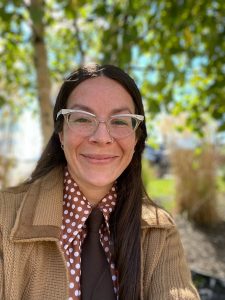Margaret Campbell
Biography
I received a Bachelor of Arts in Sociology and Women’s and Gender Studies from St. Thomas University and a Master’s in Sociology from Concordia University. I went on to complete a PhD in Social and Cultural Analysis at Concordia University, where my SSHRC supported research explored the diverse ways that people with disabilities create opportunities for intimate relationships and sexual expression. Following my PhD, I completed a Mitacs postdoctoral fellowship with the Vanier Institute of the Family and the School of Rehabilitation Therapy at Queen’s University.
My research interests reflect my desire to explore issues that are often overlooked, poorly understood, and shrouded in stigma. Grounded in critical theories and feminist frameworks, my work focuses on how institutions, policies, and social structures influence individual and family life. Currently, my research spans three distinct but interconnected areas:
1. Families, Suicide, and Grief: In collaboration with Dr. Heidi Cramm and the Families Matter Research Group, my work examines how families experience and make meaning of suicide loss, with particular attention to the organizational, cultural, and occupational conditions that shape grief and remembrance. This research is especially concerned with public safety personnel and the organizations that employ them, as organizational responses can significantly shape how suicide is recognized and remembered. I explore the extent to which these deaths are publicly or institutionally recognized, and the implications such recognition – or its absence – has for the wellbeing of bereaved families.
2. Disability and Family Life: Guided by insights from critical disability studies and feminist theories, my research explores how disability intersects with family life and wellbeing. I focus on the everyday experiences of families navigating disability. This includes work on the sexual rights, identities, and relationships of people with disabilities; the parenting experiences of individuals with disabilities; and the broader social and structural conditions that enhance or constrain family wellbeing.
3. Families and Work: I am also interested in researching the ways family life is shaped by demanding, high-risk, or non-traditional work environments, and how, in turn, familial relationships influence individual family members’ experiences of work. Much of this work is presently focused on public safety families, and involves examining how occupational risk and organizational culture impact family dynamics. My work in this area will expand to include farm families, exploring issues such as injury, suicide, and farm succession.
I teach across undergraduate and graduate levels, with past and current courses including Introduction to Family Studies (FSGN 1100), Resilient Families (FSGN 2312), Critical Theories in Family Studies and Gerontology (GFSG 6610), Family Violence across the Life Course (GFSG 6613), and Family Relations across the Life Course (GFSG 6612). In these courses, students and I explore family life in all its complexity and diversity, taking time to rethink taken-for-granted assumptions and unpack how systems of power and inequality influence family life. Both my teaching and research are grounded in a belief in the possibility of creating a more equitable, accessible, and livable world.
In addition to my teaching and research, I contribute to councils and research collectives that prioritize lived experience, support trainee development, foster interdisciplinary collaboration, and aim to influence policy. I welcome opportunities for collaboration and service within the department, across the university, and in partnership with community-based organizations.
Research and Teaching Interests
- Disability, sexuality, and family life
- Work and family dynamics
- Suicide bereavement, memorialization, and institutional response
- Family perspectives on suicide and experiences of suicide loss
- Feminist and critical theories
- Qualitative and participatory research methods
Selected Publications
- Campbell, M., & Cramm, H. (2025). The 2024 Families Roundtable: Navigating Change and Supporting Military, Veteran, and Public Safety Families. Canadian Institute for Military and Veteran Health Research (CIMVHR). https://cimvhrforum.ca/wp-content/uploads/2025/01/2024-Roundtable-Report-Final.pdf
- Campbell, M., & Cramm, H. (2024). The 2023 Families Roundtable: Families of Military Veterans, and Public Safety Personnel are the Strength Beside the Uniform. Canadian Institute for Military and Veteran Health Research (CIMVHR). https://cimvhrforum.ca/wp-content/uploads/2024/04/Roundtable-Report-2023.pdf
- Campbell, M. (2024). Families, disability, and wellbeing in Canada [Issue brief]. The Vanier Institute of the Family. https://doi.org/10.61959/i234316b Vanier Institute of the Family
- Richmond, R., Campbell, M., Delaney, L., Ricciardelli, R., & Cramm, H. (2023). Where and how organizations support families? Work-family conflict and the identification of current initiatives for family-forward policies, practices, and programs. Journal of Military, Veteran and Family Health, 10(1). https://doi.org/10.3138/jmvfh-2023-0030
- Campbell, M., & Cramm, H. (2022). The 2022 Families Roundtable: What About the Families? A Partnership to Enhance Services and Supports for Families of Military, Veterans, and Public Safety Personnel. Canadian Institute for Military and Veteran Health Research (CIMVHR). https://cimvhrforum.ca/wp-content/uploads/2023/01/Roundtable-Summary.pdf
- Martino, A., Campbell, M., Fudge Shormans, A. (2021). “Disability and Intimate Citizenship in Times of COVID-19″. The Conversation. https://theconversation.com/covid-19-has-isolated-disabled-people-from-family-love-sex-142262
- Campbell, M., Löfgren-Mårtenson, L., and Martino, A. (2020). “Editorial Introduction: ‘Cripping’ Sex Education”. Sex Education, 20(4), 361-365. https://doi.org/10.1080/14681811.2020.1749470
- Campbell, M., and Martino, A. (2020). “Exercising Intimate Citizenship Rights and (Re)Constructing Sexualities: The New Place of Sexuality in Disability Activism”. In the Routledge Handbook oof Disability Activism: Current Trends, Shifting Priorities and (Uncertain) Future Directions. Edited by Dr. Maria Berghs, Dr. Tsitsi Chataika, and Dr. Yahya El-Lahib, pp. 97-109. London and New York, Routledge.
- Campbell, M. (2017). Disabilities and Sexual Expression: A review of the literature. Sociology Compass, 11(2):e12508. 10.1111/soc4.12508
- Campbell, M. (2016). Review of “Loneliness and its Opposite: Sex, Disability, and the Ethics of Engagement”, Social Anthropology/Anthropologie Sociale, 24(2), 264-266.
